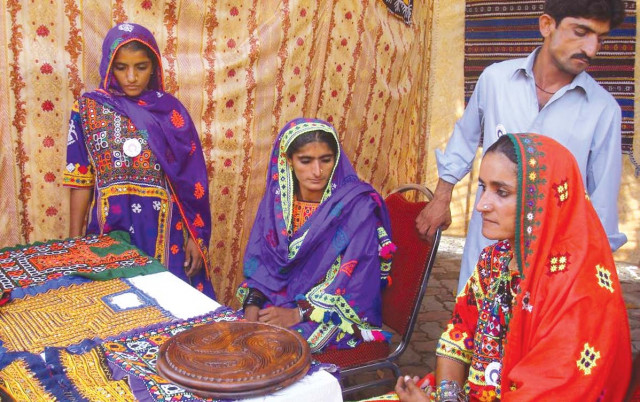Achievements, challenges of rural women
Conference calls for protection of social and economic rights of rural women and recognition of their contribution.

They signed a ‘Charter of Rights for Women in Disaster Situation’ at the opening of the two-day conference on “Implementing Resolution 1325, Challenges and Opportunities for the Rural Women in Flood-hit Areas”, organised by United Nations Development Fund for Women (UNIFEM), Potohar Organization for Development Advocacy (PODA), National Commission on Status of Women (NCSW) on the occasion of the International Rural Women’s Day at the Lok Virsa.
The speakers called for participation of rural women in policy-making and decision-making process, disaster mitigation and rehabilitation.
There are no rehabilitation and reconstruction services available specifically for the flood affected women and children, observed the speakers.
The relief and rehabilitation programmes do not meet specific needs of the women.
UNIFEM Country Director Alice Shakleford said that women take part in the progress and prosperity of the country by working 16 to 18 hours a day but their role is not acknowledged.
Besides resolving their problems, they must be given equal share in everything and involved in decision making process, Alice urged. She said that anti-harassment law is being implemented while the anti-trafficking, domestic violence and acid crimes prevention bills are in the pipeline.
National Commission on Status of Women (NCSW) Chairperson Anis Haroon said that the rural women must raise voice for their rights, assuring full support of the commission.
Benazir Income Support Programme (BISP) Chairperson Farzana Raja said Pakistan People’s Party (PPP)’ manifesto largely speaks of the social and economic empowerment of women as BISP has benefited three million families.
Some of the flood-hit women complained of violation of women’s rights, including sexual harassment in the affected areas, especially in southern Punjab, Sindh and Balochistan. The state of homelessness has left them vulnerable to physical harassment, abduction and at times rape, they alleged.
“Till date seven to eight women were picked from the flood relief camps in Muzaffargarh and assaulted,” alleged Ume Kalsoom, member District Assembly and chairman Social Youth Council of Patriots, an NGO working in the worst-affected district.
The cases remained unreported as the victims were forced to keep their mouth shut and told that their loss in the floods was more important than their dignity.
A lawyer from Bhakkar told the participants that few weeks back a 13-year-old mentally challenged girl had allegedly been raped. Some of the females from Naseerabad also complained harassment.
“Some of the young girls were fooled by some strangers who claimed them as a relief worker, took them away”, said Nusrat Wafa, a relief worker from Jaffarabad.
“We went to public representatives for help, they only consoled us, then seeked help from army saying it was not in their mandate”, she added.
“To earn my livelihood after the death of my husband in the floods I started working but faced harassment when I went in to the field,” said Nazmeen Kausar, a mother of two daughters.
Speaking on the occasion Samar Minallah, a noted filmmaker and activist said the flood has put negative impact on the minds of the women but they need to be understood on individual level. She said there is a need to raise voice on international level for help as there are a large number of flood victims who are waiting for aid.
Published in The Express Tribune, October 16th, 2010.



















COMMENTS
Comments are moderated and generally will be posted if they are on-topic and not abusive.
For more information, please see our Comments FAQ